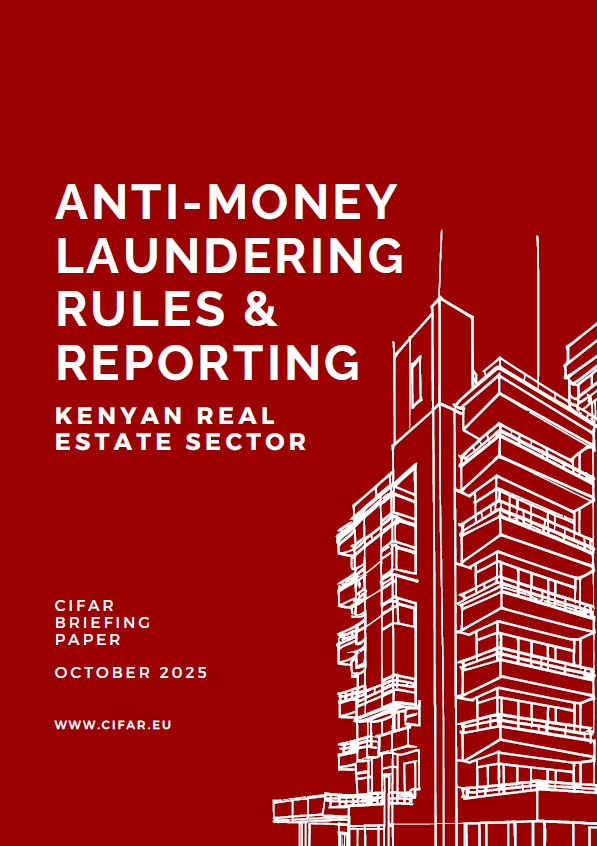In 2022, Kenya underwent a Mutual Evaluation Review (MER) conducted by the Eastern and Southern Africa Anti-Money Laundering Group (ESAAMLG) to assess compliance with international standards set by the Financial Action Task Force (FATF). The review report, along with the National Risk Assessment (NRA), identified significant vulnerabilities across several sectors, ultimately resulting in Kenya’s grey-listing in 2024 due to strategic deficiencies in combating money laundering (AML) and terrorist financing (CFT).
The real estate sector was specifically flagged as high-risk, a status driven by investment linked to politically exposed persons (PEPs), the high and appreciating value of property which is ideal for concealing large proceeds of crime, and the difficulties associated with tracking and reporting cash-based transactions.
Kenya’s AML/CFT Framework Overview
Kenya’s legal framework to address these risks and vulnerabilities is based on the Proceeds of Crime and Anti-Money Laundering Act, 2009 (POCAMLA), as amended, and the supplementary Proceeds of Crime and Anti-Money Laundering Regulations, 2023.
This legislation criminalises money laundering, which includes acquiring or transacting property known or reasonably suspected to be proceeds of crime. POCAMLA also provides measures to address money laundering, including establishing the Financial Reporting Centre (FRC) Kenya’s financial intelligence unit, the Assets Recovery Agency (ARA), and defining reporting and supervisory institutions.
Obligations For Actors in the Real Estate sector
AML/CFT laws are relevant for intermediaries that is the professionals at the centre of real estate transactions, such as real estate agents, developers, lawyers, and financial institutions.
- Real estate agents are designated as reporting institutions under Section 44-48 of POCAMLA and must conduct Customer Due Diligence (CDD) on all buyers and sellers, regardless of the transaction value. They must identify and verify the client’s identity and understand the transaction’s purpose.
- Lawyers, who were included in the AML regime in 2021 and their obligations updated in subsequent amendments of POCAMLA in 2023 and 2025 are supervised and regulated by the Law Society of Kenya (LSK), and are also required to perform CDD, maintain records, and file Suspicious Transaction Reports (STRs) with the FRC if they suspect funds involve proceeds of crime.
- Financial institutions, including banks and SACCOs are obligated to apply enhanced due diligence for high-risk clients like PEPs and must report any cash transaction exceeding USD 15,000 to the FRC.
Progress and Recommendations
Despite the challenges highlighted by the 2022 MER, Kenya has demonstrated progress in developing laws and policies to mitigate money laundering risks within the property sector. The legislative framework, supported by POCAMLA and sector-specific laws, establishes comprehensive preventive measures.
However, the real estate market is characterized by a fragmented ecosystem of actors; sellers, intermediaries, buyers, influencers, and rule-makers, leading to only partial visibility in transactions as each actor adheres to their specific reporting requirements.
About the project
This is the first of a series of reports CiFAR is producing under the Corruption in Paradise research project. This project investigates how six tourism-focused cities/regions from Brazil, Kenya, and Indonesia address illicit finance in the real estate market.
The Corruption in Paradise research project is coordinated by GRIP (Public Integrity Research Group) at USI (Università della Svizzera italiana) and also includes FGVceapg (Center for Public Administration and Government Studies at the Getúlio Vargas Foundation’s São Paulo School of Business Administration) and the CACG (Center of Anti-Corruption and Governance Studies) at Politeknik STIA LAN Jakarta.
This research is part of the Governance & Integrity Anti-Corruption Evidence (GI ACE) programme which generates actionable evidence that policymakers, practitioners and advocates can use to design and implement more effective anti-corruption initiatives. This GI ACE project is funded by UK International Development.
Read our briefing into anti-money laundering and the Kenyan real estate sector, looking at the legislative situation here.

